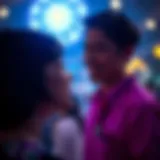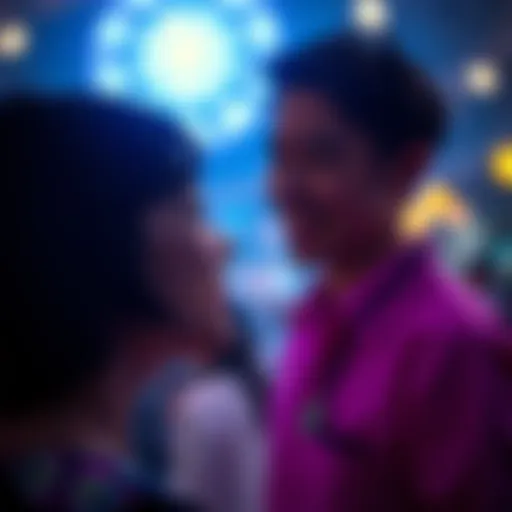Essential Literature for Thoughtful Minds: A Curated Collection of Must-Read Books in English
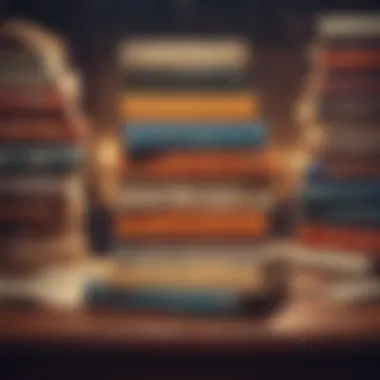
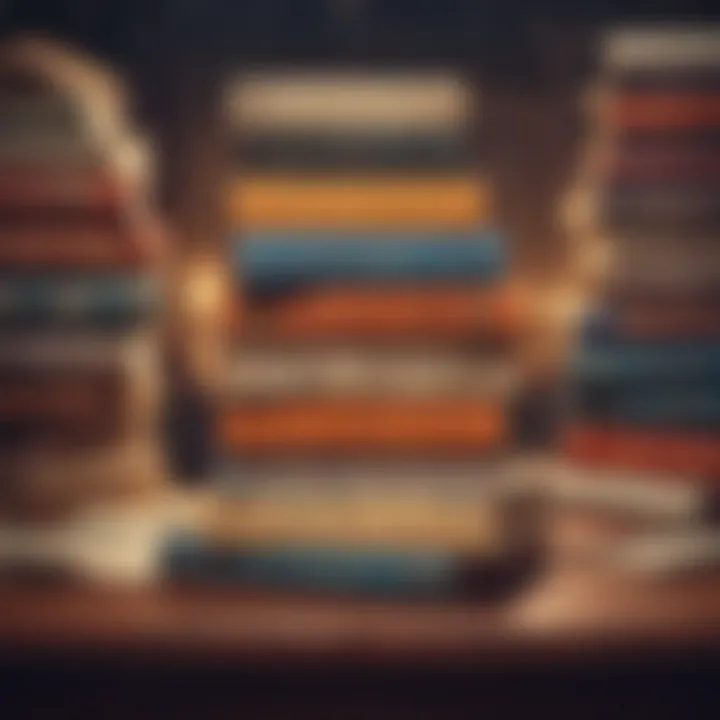
Intro
In a world overflowing with content, it’s easy to lose sight of literature that truly challenges our thinking and shapes our perspectives. Books often serve as windows into the myriad facets of human experience, offering insights that go beyond mere entertainment. This collection aims to spotlight works that particularly resonate with thoughtful minds. Whether they weave narratives rich in character and conflict or delve into abstract philosophies, each book on this list is a stepping stone toward deeper understanding and contemplation.
Exploring these selected texts allows readers to not just consume stories, but engage with them—reflecting on oneself and the world at large. The goal here isn’t just to read, but to immerse oneself in the discourse of ideas that have stood the test of time and those that are breathing new life into contemporary thinking. Let’s embark on this journey together, examining key concepts and insights from some of the most thought-provoking literature available today.
Preamble
Reading is not just a pastime; it’s an expedition into uncharted territories of thought and emotion. In the chaotic realm of daily life, the ability to grab a book and dig into another world stands as a bastion of solace and enlightenment. The significance of reading extends beyond mere enjoyment; it serves as a crucial tool for intellectual enrichment. Through literature, readers encounter diverse perspectives, grapple with complex ideas, and reflect on the human condition—all of which contribute to a well-rounded understanding of life itself.
The Relevance of Reading
In an epoch where information floods our lives through screens, the act of reading a book remains supremely valuable. It stands as a sanctuary where individuals can contemplate and introspect. Books cultivate empathy by offering stories and insights from cultures and lives different from our own. For instance, consider how Things Fall Apart by Chinua Achebe not only tells the tale of a Nigerian tribal leader but also invites the reader to ponder the implications of colonialism and cultural erosion.
Furthermore, reading strengthens critical thinking skills. Engaging with well-crafted narratives challenges readers to analyze characters' motivations, draw connections between events, and synthesize ideas across chapters. This analytical capacity is invaluable—not just in academia, but in everyday decision-making.
"A reader lives a thousand lives before he dies. The man who never reads lives only one." – George R.R. Martin
Purpose of This Collection
The intention behind compiling this collection of must-read books is to provide readers—students, professionals, and avid literature enthusiasts alike—with a roadmap towards literary enlightenment. Each selected text serves as a stepping stone on the path of understanding human experience in its myriad forms. Whether it be classic works that have stood the test of time or fresh voices in modern fiction, this collection captures the essence of storytelling that resonates across generations.
By presenting these various literary masterpieces, the aim is transcending mere recommendation. This curation endeavors to launch thoughtful discourse around each title’s themes, cultural context, and lessons. With every page turned, readers are invited to embark on a journey that layers their comprehension and appreciation of the essential truths covered in these works. The collection serves not only as a literary guide but as a reflection of the transformative power of reading.
Classic Literature
Classic literature serves as a bridge to understanding the complexities of human existence and a lens through which we can examine our own lives. These texts, penned in bygone eras, resonate with emotions, conflicts, and revelations that remain relevant today. They lay the groundwork for much of contemporary storytelling and thought, providing foundational insights that shape our understanding of society, morality, and self.
Readers who immerse themselves in classic works not only experience rich narratives but also engage with profound philosophical questions and moral dilemmas. Thus, studying classics in literature isn’t merely an academic endeavor; it’s a path to cultivating critical thinking and emotional intelligence. Through their exploration of timeless themes, such as love, loss, ambition, and despair, these novels evoke reflection on our own experiences and choices.
Understanding the Human Condition
Classic literature offers a unique avenue to grapple with the intricacies of the human experience. Take, for instance, the character studies found in these works: they are often rich and layered, shedding light on both the strengths and flaws we all possess. Novels like ‘Pride and Prejudice’ delve into societal expectations and personal desires, prompting readers to confront their own biases and expectations.
The exploration of the darker corners of the human psyche can also be found in classic texts. Works like ‘1984’ by George Orwell serve as a harrowing reminder of the consequences of totalitarianism and the fragility of individual freedom. This push and pull between societal pressures and individual agency is a recurring theme that urges readers to consider the balance in their own lives and the world around them.
Timeless Novels to Explore
‘Pride and Prejudice’ by Jane Austen
‘Pride and Prejudice’ stands as a testament to the enduring power of wit and social observation. This story showcases the nuances of romantic entanglements and the societal constraints of 19th-century England. Jane Austen's sharp dialogue and keen insights contribute a depth that makes it more than just a love story; it’s a commentary on class, gender, and the pursuit of happiness.
What sets this novel apart is Austen's ability to explore character development through the lens of irony and humor. Readers are invited to laugh at and with characters, leading to a memorable read. This blend of entertainment and critique makes it a valuable addition to this curated collection, as it encourages reflection on both personal and societal values.
The advantage of ‘Pride and Prejudice’ lies in its relatability across generations. Despite being set over two centuries ago, the themes of love and personal growth resonate with readers today.
‘’ by George Orwell
‘1984’ provides a stark portrayal of a dystopian future where government surveillance and propaganda dominate lives. Orwell's profound understanding of power dynamics resonates even in our modern context, making it ever relevant. This book stands in stark contrast to simple narratives; it challenges readers to critically analyze their own political and social situations.
One of its unique features is the concept of "Newspeak"—a language designed to limit freedom of thought. This not only serves as a warning against the manipulation of language but also compels readers to consider how language shapes our reality.
Unfortunately, the oppressive atmosphere of ‘1984’ can be heavy, which may deter some readers. However, its powerful messages about freedom and individuality are crucial for anyone looking to grasp the complexities of contemporary life.
‘Moby Dick’ by Herman Melville
‘Moby Dick’ is more than just a tale of obsession; it’s a grand philosophical exploration of good and evil within the human soul. Melville’s narrative weaves together elements of adventure, theology, and existential contemplation, creating a tapestry that is as challenging as it is rewarding.
The character of Captain Ahab, with his relentless pursuit of the titular whale, invites readers to ponder themes of revenge, madness, and the fierce struggle against nature. The unique characteristic of this novel lies in its depth, where one can find new layers of meaning with each reading.
However, its intricate style and extensive whaling metaphors may pose challenges for some. Despite this, those who persist will discover insights into humanity’s relationship with the universe, making it a worthwhile endeavor for any serious reader.
Classic literature not only serves to entertain but also to enlighten. The novels highlighted here capture the essence of timeless narratives that stimulate thought and foster a deeper appreciation for the human experience.
Modern Fiction
Modern fiction holds a crucial place in the landscape of literature. It serves not only as a reflection of contemporary society but also explores the intricate dynamics of human experiences in a world that is ever-changing. These narratives often challenge the traditional boundaries of storytelling, pushing readers to ponder complex questions about identity, culture, and morality. In essence, modern fiction provides a vital avenue for readers seeking to engage with current issues through the lens of imaginative storytelling.
Contemporary Voices


The richness of modern fiction lies in its diverse array of voices, each contributing their unique perspectives to enrich the literary conversation. Contemporary authors bring to life stories that resonate deeply, often reflecting their personal experiences or the collective struggles of their communities.
Popular themes such as migration, technology's impact on daily life, and the evolving concept of family are prevalent in this genre. As a reader, engaging with these contemporary texts is not just about enjoyment; it's about understanding society's pulse and recognizing the shared human condition across various backgrounds.
Key Works in Modern Literature
-#### ‘The Road’ by Cormac McCarthy
One of the striking aspects of The Road is its portrayal of a post-apocalyptic world. McCarthy’s sparse, haunting prose invites the reader to experience the desolation along with the characters, making it a powerful choice. It reflects themes of survival, parental love, and the struggle to maintain humanity in dire situations. The bleak atmosphere and rugged landscapes bring forth challenges that require the reader to confront their own understanding of hope and despair.
Its strength lies in character relationships, particularly between the father and son, which offers a poignant exploration of love amid chaos that resonates with anyone grappling with loss or fear.
-#### ‘The Brief Wondrous Life of Oscar Wao’ by Junot Diaz
This modern novel stands out due to its inventive narrative style, blending comic book elements, footnotes, and references to Dominican history. The Brief Wondrous Life of Oscar Wao tackles themes of identity, diaspora, and the quest for belonging. The voice of Oscar, a misfit dreaming of love and greatness, becomes a powerful metaphor for those who struggle against societal expectations. Diaz's unique storytelling approach is engaging, making the complexities of culture and race accessible to the reader, and the multi-layered narrative expands how one perceives personal histories.
-#### ‘Atonement’ by Ian McEwan
Ian McEwan’s Atonement presents an intricate blend of time, memory, and the consequences of actions. The story intricately weaves together the lives of its characters across various timelines, showcasing how a single moment can echo across lifetimes. This novel probes the depths of guilt and redemption, allowing readers to consider the moral complexities underlying human relationships. Its literary finesse lies in its narrative style, particularly the shift from innocence to an adult understanding of the nuances of love and betrayal. The rich emotional landscape makes it a gripping read that prompts readers to reflect on their own feelings about forgiveness and understanding.
"Reading is a way to be transported through time and space, offering a glimpse into worlds and minds beyond one’s own."
These key works in modern literature not only entertain but also provoke thought, opening dialogues around pressing societal issues. They are essential for any thoughtful mind seeking to understand the layers of human experience shaped by contemporary forces.
Non-Fiction Essentials
Non-fiction literature offers a vast ocean of knowledge, insights, and perspectives that delve deep into the fabric of reality. It stands apart from fiction by bringing forth the truths about our world, encapsulating real events, personal anecdotes, and scientific inquiries. Understanding this genre is crucial for anyone looking to navigate life with an informed mind and a critical eye.
The importance of non-fiction in this collection lies in its power to inform and educate. Non-fiction shapes opinions and illuminates paths by presenting evidence and reason, enriching the reader's understanding of complex subjects like history, philosophy, science, and culture. It often provides the groundwork and context for current events and societal norms, making it a valuable resource in today’s ever-evolving landscape.
Ultimately, non-fiction serves as a bridge between the reader and the complexities of the world, guiding thoughtful minds toward a deeper appreciation of reality and the underlying truths.
The Power of Insight
The power of insight refers to the ability of non-fiction works to uncover layers of understanding that might not be immediately visible. They can shift perspectives, right the misconceptions, and reveal the multifaceted nature of everyday life. Insightful books often inspire us to ask the tougher questions and encourage critical thinking. This genre is potent because it invites the reader to explore not just the flesh of facts but the skeleton beneath—those driving ideas and systems that mold our lives and societies.
Insight fuels growth. It cements the desire for knowledge in hearts eager for understanding.
Influential Non-Fiction Works
‘Sapiens: A Brief History of Humankind’ by Yuval Noah Harari
In Sapiens, Harari takes readers on a journey through the history of mankind, tracing the development of Homo sapiens from hunter-gatherers to rulers of the world. A specific aspect of this work is its exploration of how narratives shape civilizations. Harari highlights the pivotal role of shared myths in creating social cohesion and foster teamwork among vast numbers of people. This makes Sapiens an outstanding choice in this collection, as it provokes thought about our collective past and the forces shaping our present.
One unique feature of Sapiens is the way Harari tasks readers with reflecting on humanity’s future trajectory. While it raises existential questions, this characteristic might be seen as a shortcoming because of its sometimes bleak outlook. Yet, the benefits largely outweigh the disadvantages; the book encourages a broad understanding of human development, making it a must-read for anyone intrigued by our species.
‘Educated’ by Tara Westover
Tara Westover’s memoir Educated reveals her journey from growing up in a strict, survivalist family in rural Idaho to earning a PhD from Cambridge University. A standout element of this work is its intense depiction of the power of education in transforming one's life. Westover's narrative shines light on the importance of knowledge and breaking free from the constraints of ignorance. This theme resonates deeply with readers striving for personal growth and aiming to understand the barriers faced by others.
The memoir’s unique element is its raw honesty about the complexities of family relationships and self-identity. While some might argue the emotional intensity could be overwhelming, the profound lessons regarding resilience and determination make Educated a valuable addition to this collection.
‘The Immortal Life of Henrietta Lacks’ by Rebecca Skloot
Skloot’s The Immortal Life of Henrietta Lacks intertwines science, ethics, and history through the examination of Henrietta Lacks' cells, known as HeLa cells. This book’s defining aspect is its exploration of the ethical dilemmas surrounding medical research. Henrietta's story raises poignant questions about race, consent, and the exploitation in medical practices.
This book's broad appeal lies in its ability to humanize scientific advancements by narrating the often-overlooked stories behind them. A unique feature of The Immortal Life of Henrietta Lacks is Skloot's incorporation of both scientific facts and personal accounts, which enriches the narrative. However, the balance can occasionally feel skewed, leading to moments where the science may seem overwhelming for non-expert readers. Still, the advantages of understanding the origin of scientific research and its implications outweigh these issues.
Philosophical Texts
Philosophical texts form the backbone of profound thought, guiding readers through the intricate web of human existence and moral implications. Their significance in this collection lies in their ability to provoke critical thinking and introspection. Delving into these works offers insights into the larger questions of life, ethics, and the nature of reality. Engaging with philosophy encourages one to ponder their beliefs and challenges preconceived notions, fostering personal growth and intellectual development. Moreover, studying these texts creates a bridge to understand various cultural and contextual perspectives that have shaped the world we live in today.
Exploring Life’s Big Questions
At the heart of philosophy is the quest to explore life’s big questions. What does it mean to live a good life? Is there a greater purpose to our existence? These are the type of queries that often keep thinkers tossing and turning at night. By grappling with fundamental issues like morality, existence, and consciousness, philosophical texts lay the groundwork for a deeper understanding of oneself and society. Reading these works unlocks layers of meaning that can enrich an individual's life, offering both solace and challenge. It's akin to taking a long stroll through the minds of the greatest thinkers, providing those with thoughtful minds a chance to engage with ideas that have stood the test of time.
Critical Works to Consider
Digging into the critical works of philosophical literature opens up a treasure trove of wisdom. Here are three key texts that should be on everyone’s radar:
‘Meditations’ by Marcus Aurelius
‘Meditations’ is a fine product of Stoic philosophy, steeped in personal reflection and moral guidance. Written as a series of notes to himself, Aurelius emphasizes the importance of self-discipline, virtue, and rational thought. His writings encourage readers to confront adversity with grace and recognize their role in the grand scheme of existence. The distinct characteristic of this text lies in its accessibility; readers can easily connect with Aurelius’s struggles and triumphs. The unique aspect is its practical application in modern life, making it a popular choice for those seeking mindfulness and strength in the storm of chaos. However, some could argue its repetitive nature might deter those looking for more narrative-driven content.
‘The Republic’ by Plato
Plato's ‘The Republic’ is a cornerstone of Western philosophy, diving into justice, governance, and the ideal state. Through engaging dialogues, it systematically addresses the essence of fairness through the allegory of the cave and the theory of forms. This work’s key characteristic is its vision of an ideal society, making it timeless in its implications. It serves not just as a philosophical treatise but as a blueprint for sociopolitical discourse. One unique feature is how it intertwines ethics with governance, offering critical insights into human nature. A potential drawback for some modern readers may be its degree of abstraction, requiring considerable contemplation to grasp full implications.


‘Beyond Good and Evil’ by Friedrich Nietzsche
Nietzsche’s ‘Beyond Good and Evil’ shakes the foundational concepts of morality and challenges the status quo. The text examines the ideas of truth, morality, and power in an enigmatic style that compel readers to reevaluate their understanding of right and wrong. Its key quality lies in its invigorating critique of philosophical doctrines and dogmas that have dominated Western thought. Nietzsche’s daring assertions encourage readers to cultivate a personal morality rather than adhere strictly to societal norms. This text's unique approach lies in its poetic prose mixed with philosophical inquiry, making it a fascinating read, though the dense rhetoric may pose a challenge for novices.
Engaging with philosophical texts not only enriches intellectual life but also fosters a deeper connection to the shared human experience.
In delving into these works, readers are provided with a framework to translate abstract ideas into actionable insights within their own lives. Each text brings its unique flavor, contributing essential building blocks for understanding complex philosophical landscapes.
Influential Biographies
Biographies offer a window into the lives of extraordinary individuals, providing valuable insights into their struggles, triumphs, and the philosophies that shaped their existence. These narratives can illuminate the human experience like few other genres can, as they merge fact with the compelling stories of those who have influenced society in meaningful ways. Understanding the challenges and victories of different people helps readers appreciate the complexities of life and the resilience of the human spirit.
Reading biographies is not just about learning dates and events; it’s about connecting with the emotional undertones that underpin those experiences. The lessons derived from these accounts can inspire, provoke thought, and even instigate change in readers' lives, making biographies a vital element of this collection.
Lessons from Lives Led
The essence of biographies lies in their ability to convey profound lessons derived from the lived experiences of their subjects. When we explore the paths taken by great minds and resilient spirits, we may find reflections of our own journeys. The mistakes, decisions, and milestones of these iconic figures often resonate deeply, guiding readers in their quests for personal authenticity and success.
Consider how the trials faced by these individuals can teach resilience. Each biography serves as a reminder that setbacks are often stepping stones. By examining the high and low points of someone’s life, readers can glean strategies for navigating their challenges. It’s not merely about the destination but the journey itself, enriched by lessons learned along the way.
Biographies Worth Reading
‘The Diary of a Young Girl’ by Anne Frank
This poignant diary not only recounts the daily trials of a young girl hiding from the horrors of war but also showcases the unfaltering hope in the face of adversity. The Diary of a Young Girl captures the essence of Anne's evolving identity during the tumultuous years of the Holocaust. Its contribution to our understanding of history and humanity is immeasurable.
A key characteristic of this work is its honesty, steeped in innocence yet robust in emotional depth. Readers find themselves walking alongside Anne as she navigates her adolescence away from the world outside, a world that is riddled with danger. The diary's unique feature is its unfiltered voice, revealing the complexity of youthful thoughts amid harrowing circumstances. This provides a special advantage in this collection, making it a relatable choice for those seeking insight into resilience and hope in dark times.
‘Long Walk to Freedom’ by Nelson Mandela
Nelson Mandela's Long Walk to Freedom is not just a biography; it's a comprehensive narrative that seeks to redefine freedom and human rights in the modern context. By chronicling his life from childhood to presidency, Mandela offers readers a glimpse into the commitment required for societal change.
What makes this biography particularly impactful is Mandela’s unwavering spirit against oppression. His candidness in detailing not just his achievements but also his hardships has a profound effect. It showcases how patience and perseverance can lead to monumental change. This candid approach makes it a compelling and beneficial choice for readers interested in exploring diverse experiences in the pursuit of equality and justice.
‘Steve Jobs’ by Walter Isaacson
Walter Isaacson's Steve Jobs dives deep into the mind of one of the most influential entrepreneurs of our time. The biography presents Jobs not just as a tech visionary but as a complex individual whose passion and sometimes abrasive personality shaped the landscape of modern technology.
A key aspect of this biography is its ability to blend professional successes with personal struggles. This multifaceted view allows readers to appreciate the nuance of Jobs's character while extracting lessons about innovation and perseverance. The unique lens of Jobs’s life offers insights into creativity and the challenges of leading with a vision, making it an invaluable addition to this curated collection. However, readers should be prepared for a portrayal that does not shy away from his flaws, as these complexities add to the overall narrative.
“Biography can be a powerful tool, guiding us through the rough patches of our own narratives by revealing the trails blazed by those who came before us.”
Through these biographies, readers embark on journeys that do not just inform but also transform, steering them towards deeper understanding and self-reflection.
Impactful Poetry
Poetry possesses a unique ability to articulate the inexpressible, to unravel emotions and thoughts in just a few stanzas. It's where complex ideas meet concise language, allowing readers to ponder over the myriad meanings packed within lines. Within this collection, impactful poetry is not merely a genre but a living conversation about our experiences, hopes, and fears. The beauty of poetry lies in its power to connect deeply with individuals, often capturing universal experiences through personal lenses.
The Art of Expression
At its core, poetry is a form of art that thrives on brevity, intensity, and imagery. Each word is weighed with purpose, often leaving readers with lingering questions or emotions. The rhythm, meter, and sound play a crucial role in enhancing the emotional experience. Furthermore, poetry doesn’t just tell a story; it invites the reader to partake in an emotional journey, encouraging personal reflection on their own thoughts and feelings.
Investigating the art of expression in poetry can open doors to new perspectives, sharpen our empathic skills, and fuel our creative thoughts.
Poetic Masterpieces
The realm of poetry showcases various voices that have shaped literary landscapes, conveying messages that resonate through time. By exploring these poetic masterpieces, readers can gain insights into not only the human condition but also cultural shifts and individual journeys. Here are some standout works that merit attention:
Works by Emily Dickinson
Emily Dickinson's poetry is a well of introspection and observation. Her ability to distill complex emotions and thoughts into brief, poignant lines sets her apart. For instance, Dickinson often played with unconventional punctuation and capitalization, lending her a unique voice that stands the test of time. Key characteristics of her work include themes of nature, death, and the self, inviting readers to contemplate existence itself.
One distinctive feature of her work is the use of slant rhyme, which creates a sense of surprise and reflects the complexities of her emotions. This aspect lends an advantage—readers can discover new meanings with each visit to her texts. However, it can also present challenges; some may find her style abstract or inaccessible. Regardless, Dickinson's contributions remain an invaluable part of any thoughtful literary exploration.
‘The Waste Land’ by T.S. Eliot
T.S. Eliot’s ‘The Waste Land’ is a cornerstone of modernist poetry, weaving together various voices, cultures, and texts to explore the disillusionment of a post-war world. One of its defining characteristics is the intricate use of allusions—Eliot taps into a broad range of references, from the mythic to the contemporary, constructing a tapestry that captures the chaos of modern existence.
The unique feature of ‘The Waste Land’ lies in its fragmented narrative style, which mirrors the disjointed reality of the time. This factor allows readers to experience the overwhelming rush of thoughts and feelings associated with societal changes. However, this complexity can be both an advantage and a disadvantage; readers might feel overwhelmed or find the text richly rewarding, depending on their engagement. Eliot's work is undeniably a pivotal inclusion for readers aiming to understand the shifts in poetic expression.
‘Leaves of Grass’ by Walt Whitman

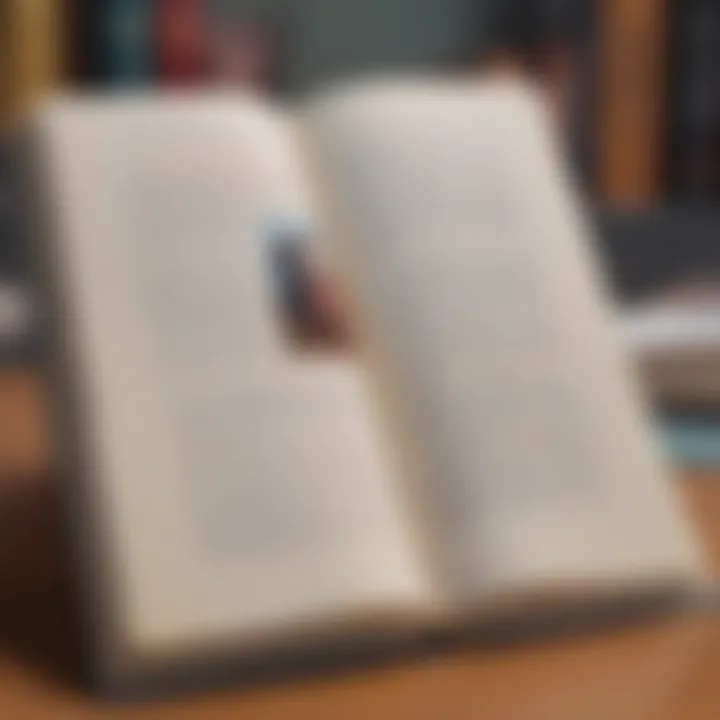
Walt Whitman’s ‘Leaves of Grass’ is celebrated for its unabashed celebration of individuality and the American spirit. Key to Whitman’s style is his free verse approach, which breaks traditional forms and allows natural speech patterns to breathe. This allows a flow that embodies life’s spontaneity and rhythm.
The poem’s unique ability to encompass diverse themes—ranging from the simple beauty of everyday life to profound philosophical musings—resonates deeply with readers. However, the expansive nature of the text can pose challenges; some may feel lost in the myriad of ideas. Nevertheless, the book remains a beloved choice for those looking to explore a broad envision of humanity and nature through poetic lenses.
Visionary Science Fiction
Science fiction serves as a portal to the future, enabling readers to explore not only technological advancements but also the possible ramifications of our societal choices. Within this genre, imaginative foresight and prophetic storytelling converge to challenge conventional thinking. Visionary science fiction does more than entertain; it sparks profound discussions about identity, ethics, and the human experience. The narratives push the boundaries of creativity, providing a canvas for authors to paint their vision of what could be. This allows readers to consider not just the feasibility of new inventions or ideas but also the wider implications they hold for our world — for better or worse.
Imagining the Future
In the realm of visionary science fiction, authors stretch the imagination while rooting their stories in relatable themes. This genre invites readers to step into worlds that reflect our hopes, fears, and dreams about the future. The narratives often serve as cautionary tales, highlighting the consequences of human actions and societal structures in a speculative context. As readers engage with these texts, they are prompted to critically analyze their own beliefs and values while pondering the trajectory of humanity.
Groundbreaking Sci-Fi Novels
Several novels stand out within the visionary science fiction category. These texts have influenced countless discussions and helped to shape cultural paradigms. Below are three cornerstone works that exemplify the depth and richness of this genre:
‘Dune’ by Frank Herbert
‘Dune’ takes readers to the desert planet of Arrakis, where politics, religion, and ecology intersect dramatically. The novel explores the consequences of power, environmental conservation, and spirituality. Herbert's intricate worldbuilding creates a multifaceted narrative that delves into the psychological and societal struggles of its characters. The key characteristic of ‘Dune’ is its deep philosophical underpinnings—it's not just about the struggle for control but rather the interplay of influences that drive human and ecological survival. This makes it a significant choice for the collection of must-read books, as it encourages critical reflection on modern challenges like climate change and resource scarcity. The unique feature of ‘Dune’ lies in its complex political landscape, where each action has far-reaching implications. Readers benefit from this multilayered approach, although some may find its density and length a challenge.
‘Neuromancer’ by William Gibson
‘Neuromancer’ is a seminal work that essentially laid the groundwork for the cyberpunk subgenre. The novel introduces the concepts of cyberspace and virtual reality long before they became commonplace in modern society. Gibson's narrative is rich with technologic speculation, highlighting the intertwining of humanity and machine. The key characteristic of ‘Neuromancer’ is its exploration of AI and consciousness, which raises critical questions about identity in a rapidly advancing world. This text is an essential addition to the collection as it provides a prophetic view into digital culture, preparing readers for discussions about the ethics of technology. One of the unique features of ‘Neuromancer’ is its stylistic approach, filled with gritty realism and vibrant descriptions that may either enthrall or confuse newer readers.
‘The Left Hand of Darkness’ by Ursula K. Le Guin
‘The Left Hand of Darkness’ delves into themes of gender and society on a planet where the inhabitants have no fixed sex, challenging the readers’ preconceptions about gender roles and identity. Le Guin's exploration of the fluidity of gender serves as a powerful reflection on societal constructs. The key characteristic of this novel is its cultural richness, represented through the eyes of an outsider exploring a vastly different world. This novel carries a significant weight in discussions about human relationships and understanding. Its unique feature is how it melds thoughtful sociology with engrossing science fiction, presenting both the advantages and challenges of such a perspective. Readers may find themselves re-evaluating their perceptions about gender and connection long after closing the book.
Literature, in the scope of visionary science fiction, not only entertains but beckons readers to consider the vast potentials and challenges that lie ahead.
Cultural Reflections in Literature
Cultural reflections in literature serve as a critical lens through which readers can examine their societies and themselves. This aspect of literature not only emphasizes the norms and values of different cultures but also raises questions about identity, belonging, and the human experience. In this article, exploring cultural reflections allows readers to appreciate how literature captures the essence of diverse backgrounds and promotes empathy. Understanding these cultural narratives helps broaden one's horizons, challenging preconceived notions and enhancing intellectual growth.
Literature as a Mirror
When literature reflects society, it acts like a mirror, showing us both the beauty and flaws within our cultures. It enables readers to see their own lives mirrored in the stories of others. The narratives often tackle pivotal issues such as race, gender, and class, inviting critical thought and introspection. As readers, we can identify ourselves in the characters, sometimes recognizing shared struggles or aspirations. This connection can provide a profound awareness of our shared humanity, driving the point home that while our stories may differ, our emotions and desires are often quite similar.
Books Shaping Cultural Discourse
Books have a unique place in shaping cultural discourse. They don't only tell stories; they drive conversations and challenge societal norms. Below are essential works that have influenced discussions within their cultures:
‘The Joy Luck Club’ by Amy Tan
’The Joy Luck Club’ explores the intricate relationship between Chinese-American mothers and their daughters. A specific aspect that resonates deeply is how it highlights the clash of cultural identities across generations. The key characteristic of this book lies in its rich storytelling that weaves together multiple perspectives. It is popular because it candidly discusses struggles related to cultural identity while celebrating the nuances of each generation's experience. Its unique feature is the blend of personal narrative with broader cultural themes, making it a beneficial choice for this article. However, one might argue that the pacing can feel uneven at times, but the emotional weight it carries often outweighs such concerns.
‘Americanah’ by Chimamanda Ngozi Adichie
’Americanah’ is a powerful narrative on race, immigration, and identity. One compelling aspect of this novel is its exploration of what it means to be black in America as compared to Nigeria. The key characteristic that stands out is Adichie's incisive prose, which reveals the complexities of navigating different cultures. This book is a celebrated choice as it shines a light on the immigrant experience with authenticity and nuance. Its unique feature is the dual perspectives of the protagonist as she oscillates between Nigeria and the United States, showcasing cultural contrasts and shared humanity. While some readers may find its length daunting, the insights presented more than make up for any drawbacks.
‘Things Fall Apart’ by Chinua Achebe
’Things Fall Apart’ is a seminal work that addresses the impacts of colonialism on African society. The specific aspect of this novel lies in its deep exploration of the Igbo culture and the subsequent disruption caused by outside forces. Achebe's text is distinguished by its ability to humanize individuals caught in the sweep of history, thus making it a beneficial choice for understanding cultural reflections. The unique feature is its narrative style that incorporates proverbs and folklore, enriching the reader's experience with cultural authenticity. However, the story’s tragic undertones may not suit everyone's taste, yet it remains a critical text for grasping the consequences of colonialism.
"Books are the quietest and most constant of friends; they are the most accessible and wisest of counselors, and the most patient of teachers." - Charles W. Eliot.
Closure
In this vast sea of literary offerings, the journey through words and thoughts can profoundly shape our perceptions and beliefs. The importance of reading is not merely in the act itself, but in its power to expand our horizons, challenge our views, and cultivate empathy. Literature serves as a vehicle through which we can traverse the most intricate aspects of the human experience—from joy and love to suffering and despair. It invites readers to encounter diverse cultures, philosophies, and experiences, fostering a rich tapestry of understanding.
The Ongoing Journey of Reading
Reading is not simply an end-goal; it’s a dynamic process that continues as long as there are pages to turn and stories to be told. Each book we explore opens new windows, allowing us to peek into other minds and worlds. This journey is ongoing. It transforms not only our intellect but also our emotional landscapes. Every time we engage with a text, we add layers to our understanding that informs our interactions with the world around us. Revisiting writings—be they a cherished classic or stirring contemporary piece—often uncovers fresh insights. It sometimes feels like visiting an old friend who has now grown wiser. There lies a unique resonance in discovering worn paths we thought we had fully explored.
Encouragement to Explore Further
As we wrap up this narrative, the call to explore further remains essential. With thousands of voices whispering through pages, it’s up to us to seek out stories that resonate or challenge us. Don’t shy away from texts outside your comfort zone; they might unveil perspectives and ideas previously hidden in the corners of your mind.
- Explore different genres. Branching out can uncover fascinating connections.
- Engage in discussions. Sharing interpretations with others often breathes new life into stagnant ideas.
- Seek recommendations. Expanded knowledge through curated lists or community discussions around literature can lead to surprises.
Literature is a vast ocean, and the beauty lies in its bottomless depth. Remember, every page turned is a step taken in understanding ourselves and the complexities of existence. Seek out the texts that speak to you, and allow them to transform your journey into an enriching experience.
"A reader lives a thousand lives before he dies. The man who never reads lives only one." – George R.R. Martin
As you seek to deepen your connection to literature, take the time to wander through the curated selections outlined here. Embrace the diferentes experiences and insights they offer, for the world of words is infinite, beautiful, and always waiting.




